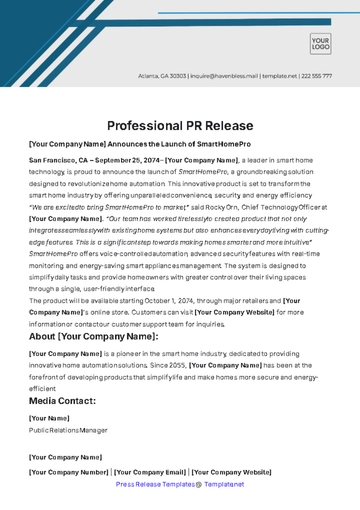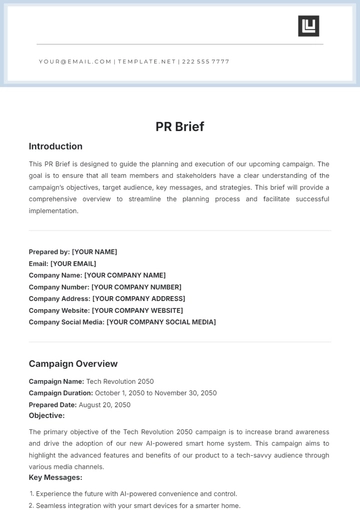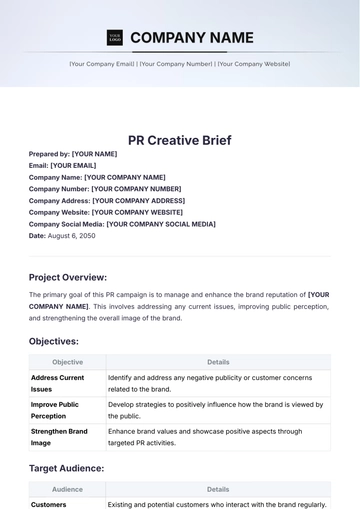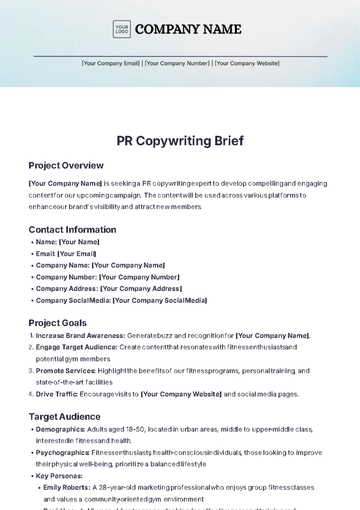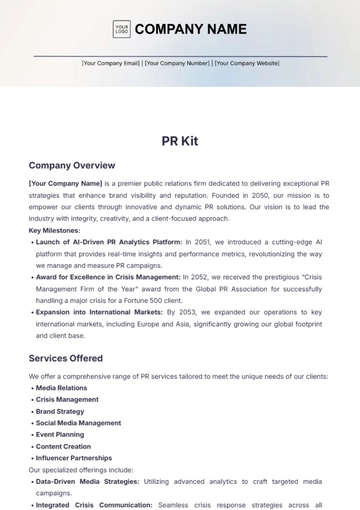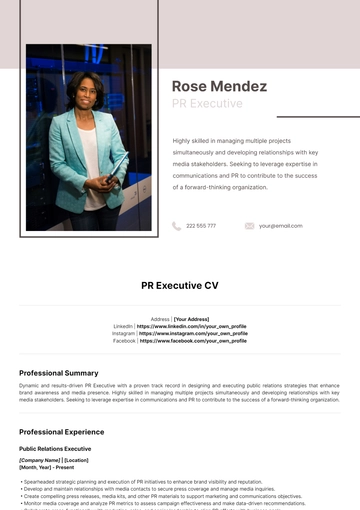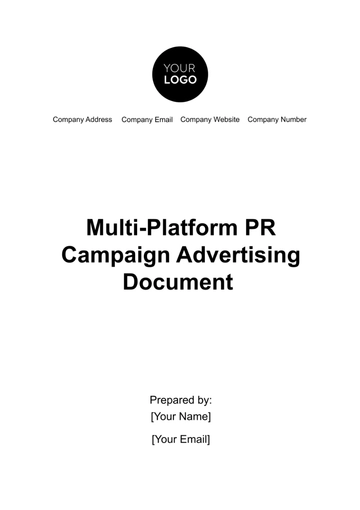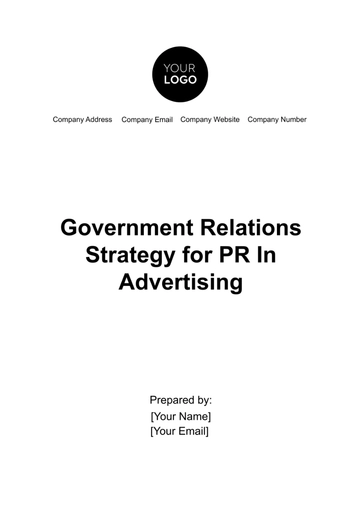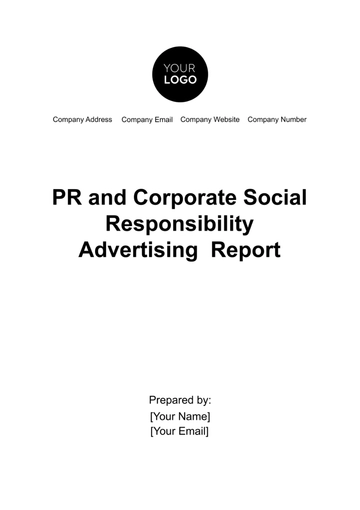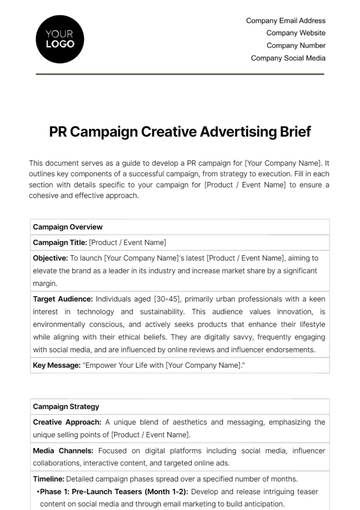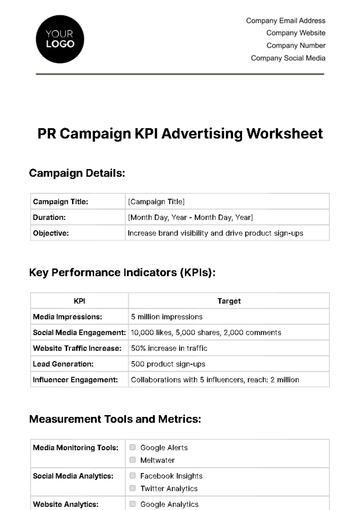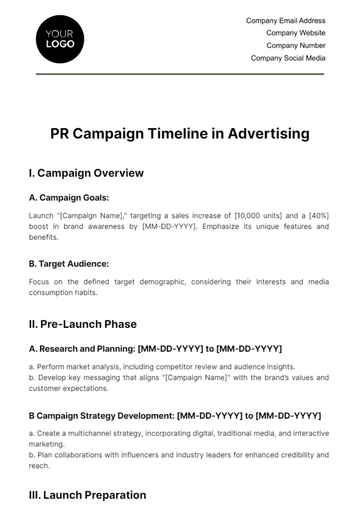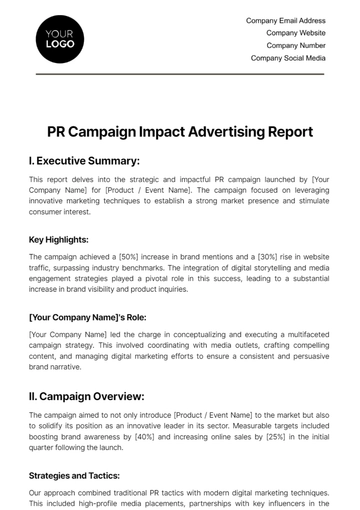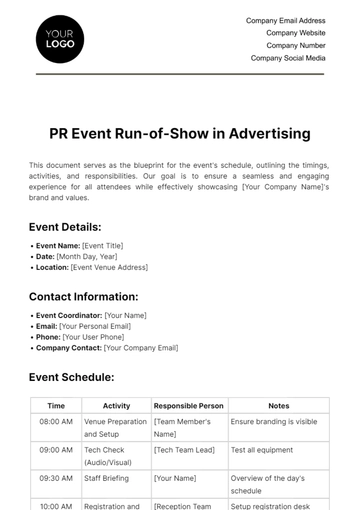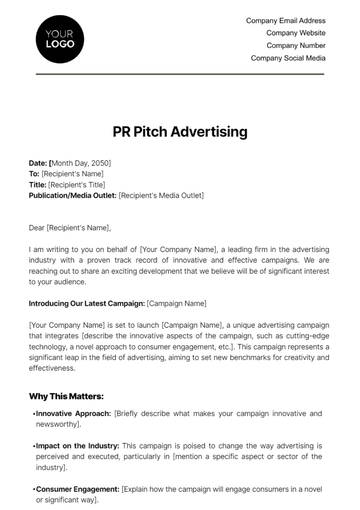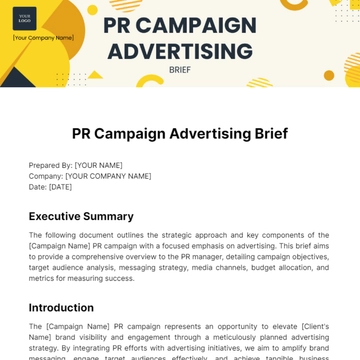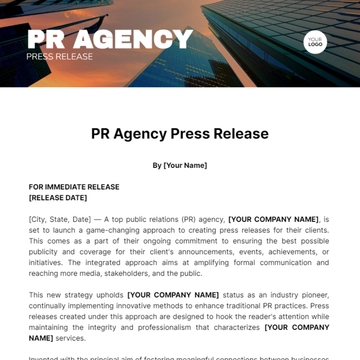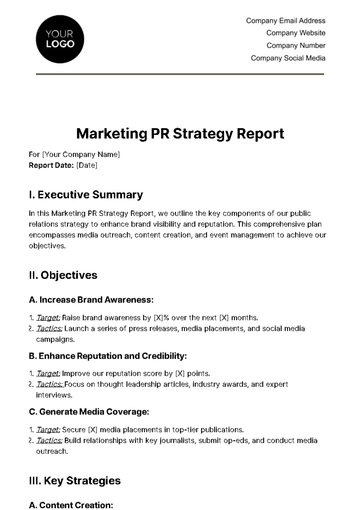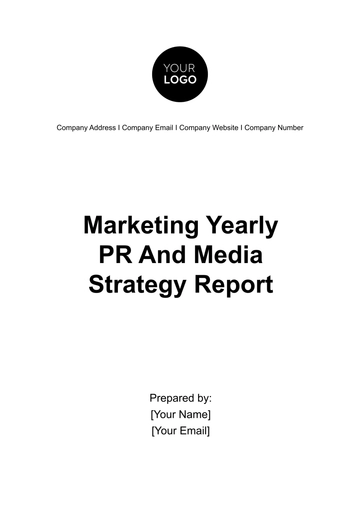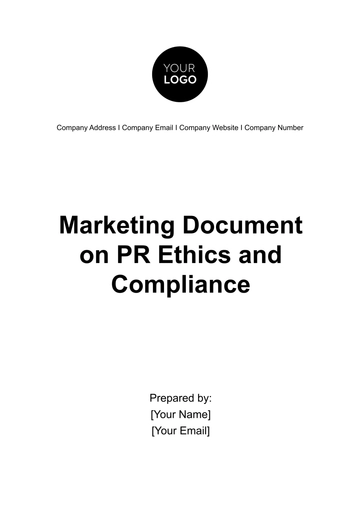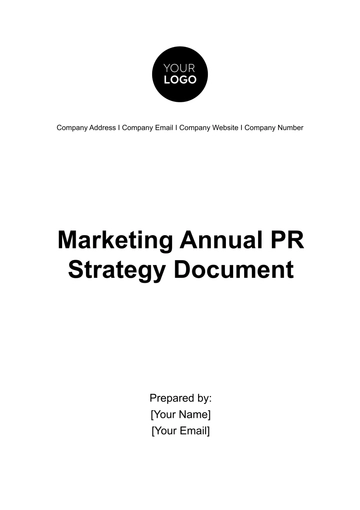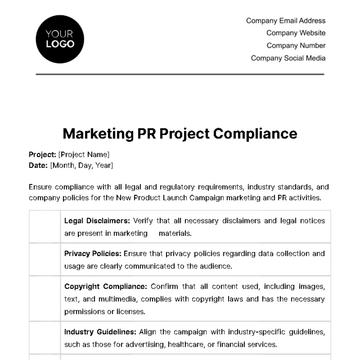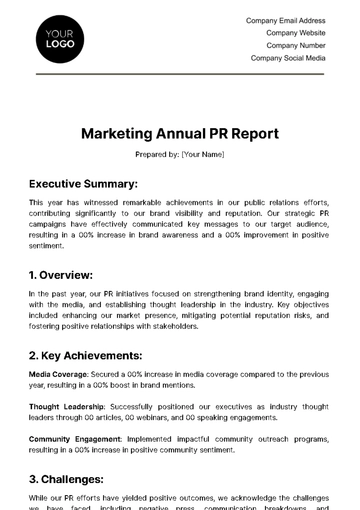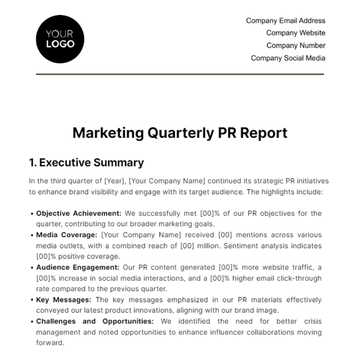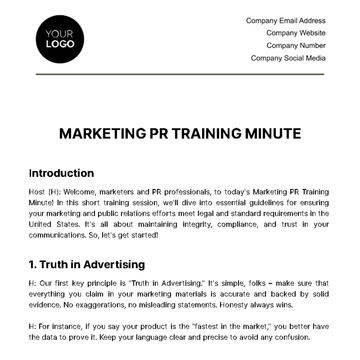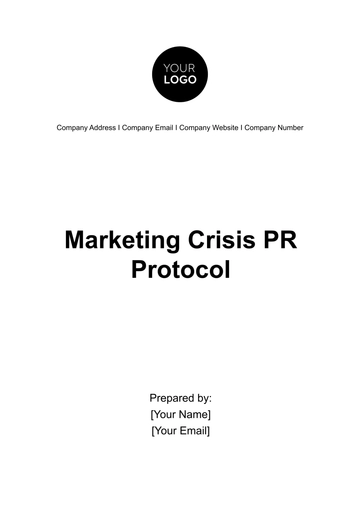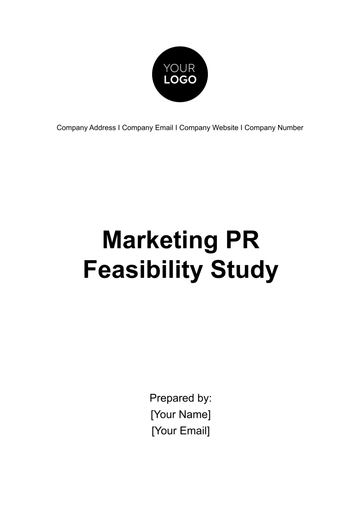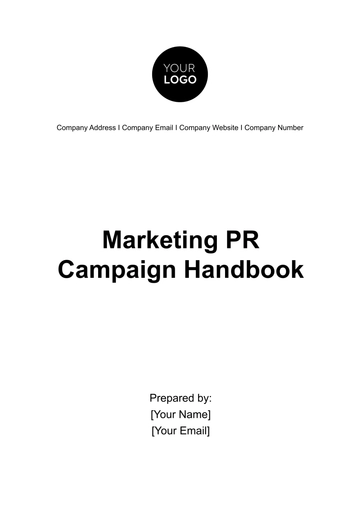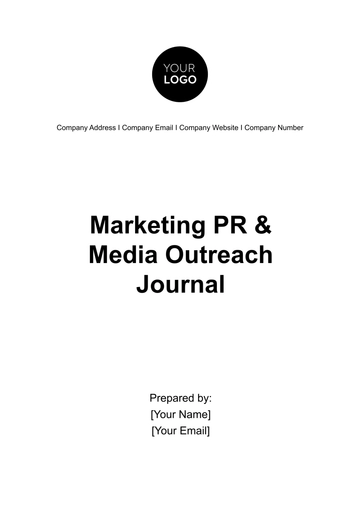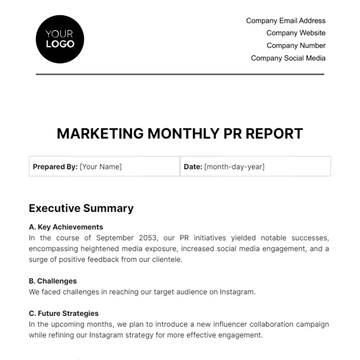Free Marketing Document on PR Ethics and Compliance
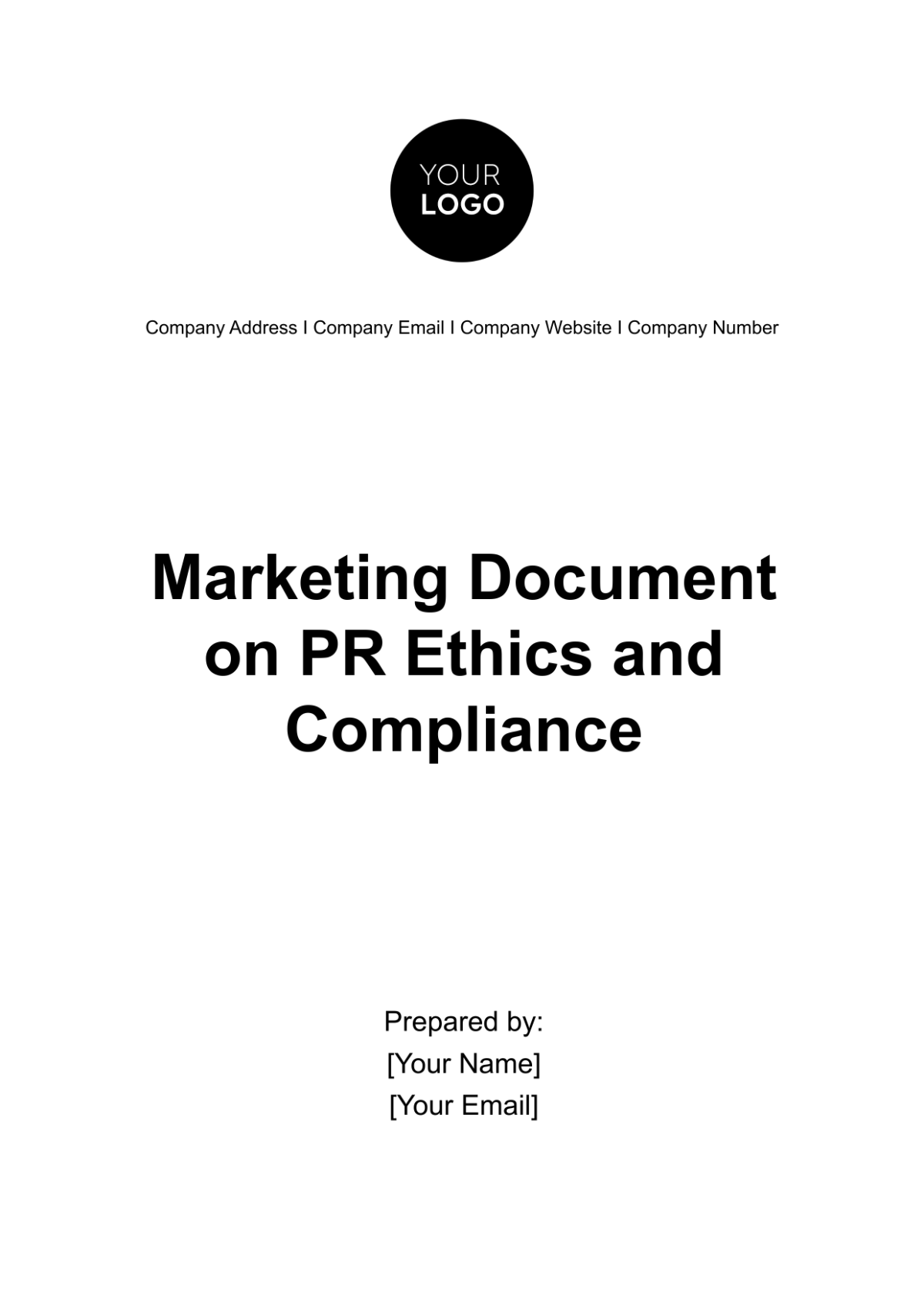
and Compliance
Executive Summary
The Executive Summary serves as a concise yet compelling introduction to the entire document. It encapsulates the key points and objectives, providing an overview for busy executives and stakeholders. In this section, we aim to present a compelling case for the significance of PR ethics and compliance.
Public relations (PR) plays an integral role in shaping an organization's image and reputation in the eyes of the public, clients, and stakeholders. The ethical conduct of PR professionals and adherence to compliance standards are crucial components of this role. In an era where information travels at the speed of light and trust can be easily eroded, maintaining ethical standards in PR is not just desirable but imperative.
A. The Importance of Ethical PR
Recent years have witnessed a proliferation of PR blunders, where organizations faced severe backlash due to ethical misconduct. These incidents have underscored the importance of ethics in PR, reinforcing that any lapse in ethical judgment can have far-reaching consequences.
B. Compliance as a Shield
Compliance with regulatory and industry standards serves as a protective shield for organizations engaged in PR activities. It ensures that PR campaigns and messaging align with legal and ethical norms. Non-compliance can lead to costly legal issues, damage to reputation, and the erosion of trust.
Introduction
A. Purpose of the Document
The purpose of this document is to shed light on the principles, practices, and policies that govern PR ethics and compliance. It is intended to be a valuable resource for individuals and organizations looking to enhance their understanding of these crucial aspects of PR.
B. Scope of PR Ethics and Compliance
The scope of PR ethics and compliance extends beyond mere regulatory adherence. It encompasses a holistic approach to PR activities that ensures they are not only legal but also ethical, transparent, and aligned with the organization's values and societal expectations.
PR Ethics
A. Definition of PR Ethics
PR ethics encompass a set of principles, values, and guidelines that govern the conduct of public relations professionals in their interactions with clients, the public, the media, and other stakeholders. At its core, PR ethics is about doing what is morally right and responsible in the practice of public relations.
PR ethics involve a commitment to transparency, honesty, integrity, and respect. It means ensuring that information shared with the public is accurate, fair, and devoid of manipulation or deception. It entails safeguarding the privacy and rights of individuals and organizations while promoting open and ethical communication.
B. Importance of PR Ethics
The importance of PR ethics cannot be overstated. Ethical PR practices build and maintain trust, which is the bedrock of successful public relations. When PR professionals act ethically, they enhance an organization's reputation, credibility, and long-term viability.
Ethical PR also safeguards against a reputational crisis. By adhering to ethical principles, organizations are better equipped to navigate potentially damaging situations and emerge with their reputation intact.
Code of Ethics
A robust code of ethics serves as a guiding compass for PR professionals. It outlines the core principles and values that must be upheld in all PR activities. Common elements of a PR code of ethics include:
Honesty: PR professionals should always be truthful and accurate in their communications.
Transparency: Transparency in PR activities ensures that stakeholders have access to information that affects them.
Confidentiality: Respecting the confidentiality of sensitive information is crucial.
Respect: PR professionals should treat all individuals and organizations with respect and dignity.
Conflict of Interest: Policies should address situations where conflicts of interest may arise.
Compliance Framework
A. Regulatory Landscape
The regulatory landscape governing public relations is complex and constantly evolving. PR professionals must stay informed about relevant laws, regulations, and industry standards that pertain to their work. Key aspects of the regulatory landscape include:
Federal and State Regulations: Laws such as the Federal Trade Commission (FTC) guidelines and state-specific laws on advertising and public relations.
Industry Codes: Many industries have their own codes of ethics and compliance standards.
Data Privacy: Compliance with data privacy laws, such as the General Data Protection Regulation (GDPR) in Europe or the California Consumer Privacy Act (CCPA) in the United States.
B. PR Compliance Policy
A PR compliance policy is a crucial document that outlines an organization's commitment to ethical and compliant PR practices. It serves as a roadmap for PR professionals, detailing expectations and procedures related to compliance. Key components of a PR compliance policy include:
Objectives: Clear objectives related to ethical conduct and compliance.
Responsibilities: Roles and responsibilities of PR professionals, managers, and compliance officers.
Training: Requirements for ongoing education and training in PR ethics and compliance.
Monitoring: Procedures for monitoring PR activities for compliance and ethical standards.
Reporting: Mechanisms for reporting ethical concerns or compliance violations.
Ethical PR Practices
A. Transparent Communication
Transparent communication is a cornerstone of ethical public relations. It involves sharing information openly and honestly with stakeholders, ensuring that there are no hidden agendas or misleading messages. Key aspects of transparent communication in PR include:
Full Disclosure: PR professionals should provide complete and accurate information, even when it may be unfavorable to the organization.
Avoiding Spin: Avoiding the use of spin or manipulative language to shape perceptions.
Accessibility: Making information accessible to all stakeholders, including the media and the public.
Transparent communication builds trust by demonstrating that an organization has nothing to hide and is committed to open and honest interactions.
B. Honesty and Accuracy
Honesty and accuracy are non-negotiable principles in ethical PR. PR professionals must ensure that all information they disseminate is truthful and free from distortion. Practices that promote honesty and accuracy include:
Fact-Checking: Rigorously fact-checking all information before release.
Correcting Mistakes: Promptly acknowledging and correcting any inaccuracies or mistakes.
Avoiding Misleading Tactics: Refraining from using misleading tactics, such as selective editing or out-of-context quotations.
Honesty and accuracy are essential for maintaining credibility and preventing reputational damage.
C. Respect for Privacy
Respecting the privacy of individuals and organizations is a fundamental ethical principle in PR. This involves obtaining consent when necessary, protecting confidential information, and avoiding invasive tactics. Key considerations for respecting privacy in PR include:
Informed Consent: Obtaining explicit consent when using personal or confidential information in PR activities.
Data Protection: Complying with data protection laws and ensuring the security of sensitive information.
Balancing Public Interest: Weighing the public's right to know against an individual's right to privacy.
By respecting privacy, PR professionals demonstrate their commitment to ethical conduct and legal compliance.
Compliance Measures
A. Risk Assessment
Effective risk assessment is a proactive approach to ensuring PR ethics and compliance. PR professionals and organizations must identify potential ethical and compliance risks and develop strategies to mitigate them. Key steps in risk assessment include:
Identifying Risks: Identifying potential risks related to PR activities, such as misleading messaging or violations of data privacy.
Assessing Impact: Assessing the potential impact of these risks on the organization's reputation and legal standing.
Risk Mitigation: Developing strategies and protocols to mitigate identified risks.
B. Monitoring and Reporting
Monitoring and reporting are essential for maintaining compliance and ethical standards. Organizations should establish mechanisms to track PR activities, detect compliance violations, and report any ethical concerns. Key elements of monitoring and reporting include:
Regular Audits: Conducting regular audits of PR activities to ensure compliance.
Whistleblower Mechanism: Providing a confidential mechanism for employees and stakeholders to report ethical concerns.
Reporting Procedures: Clearly defining the steps for reporting compliance violations and ethical lapses.
PR Ethics Training
A. Employee Training
Effective PR ethics training is essential to ensure that all members of an organization are aware of and capable of adhering to ethical standards. Employee training programs should be designed to:
Educate on Ethical Principles: Provide comprehensive training on the principles and values of PR ethics, including transparency, honesty, and respect for privacy.
Case-Based Learning: Utilize real-world case studies to illustrate ethical dilemmas and how to navigate them.
Legal Compliance: Include information on relevant laws and regulations, such as data privacy laws and industry codes of ethics.
Interactive Workshops: Conduct interactive workshops that encourage discussions and critical thinking about ethical scenarios.
Assessment and Certification: Implement assessments to gauge employees' understanding and provide certifications upon completion.
Regular and ongoing training is crucial to keep employees up-to-date with evolving ethical standards and compliance requirements.
B. Continuous Learning
Ethical PR practices evolve over time, and PR professionals must engage in continuous learning to stay current. Continuous learning initiatives can include:
Industry Seminars: Encourage attendance at industry-specific seminars and conferences focused on PR ethics and compliance.
Internal Workshops: Conduct regular internal workshops or webinars on emerging ethical issues and best practices.
Ethics Resources: Provide access to resources such as ethical guidelines, whitepapers, and industry publications.
Mentorship Programs: Establish mentorship programs where experienced PR professionals guide newer team members in ethical decision-making.
By fostering a culture of continuous learning, organizations can adapt to changing ethical landscapes and proactively address emerging challenges.
Compliance Reporting and Communication
Effective reporting and communication are integral components of a robust compliance program. This section focuses on how organizations can establish mechanisms for reporting compliance status and communicate their commitment to ethical and compliant practices.
A. Compliance Reporting Mechanisms
Organizations should implement clear and efficient mechanisms for reporting compliance status and concerns. Key elements include:
Regular Reporting: Establish a schedule for reporting compliance status to relevant stakeholders, such as senior management and the board of directors.
Incident Reporting: Create a system for employees to report compliance incidents or concerns confidentially, ensuring protection against retaliation.
Documentation: Maintain comprehensive records of compliance reports and incidents for transparency and accountability.
Escalation Protocol: Define a clear protocol for escalating compliance issues when necessary, ensuring swift action and resolution.
B. Transparency and Accountability
Transparency and accountability are essential principles in compliance reporting and communication:
Stakeholder Communication: Regularly communicate the organization's commitment to compliance and ethical conduct to stakeholders, including clients, partners, and the public.
Ethical Reporting: Ensure that all compliance reports and communications are honest, accurate, and free from manipulation.
Accountability Measures: Implement accountability measures to hold individuals and teams responsible for compliance breaches.
C. Compliance Communication
Organizations should proactively communicate their compliance efforts to build trust and demonstrate commitment:
Internal Communication: Share compliance updates, training, and best practices within the organization to foster a culture of compliance.
External Communication: Communicate the organization's compliance status and commitment to ethical conduct in marketing materials, websites, and public statements.
Regulatory Reporting: Comply with any legal requirements for reporting compliance status to regulatory authorities.
D. Feedback and Improvement
Feedback and continuous improvement play a crucial role in compliance reporting and communication:
Feedback Loop: Establish a feedback mechanism for stakeholders to provide input on compliance practices and communication effectiveness.
Periodic Review: Regularly review and assess the organization's compliance reporting and communication strategies for effectiveness.
Adjustments: Use feedback and assessment results to make necessary adjustments to reporting and communication practices.
Conclusion
A. Recap of Key Points
In this comprehensive marketing document, we have explored the critical importance of PR ethics and compliance in today's business landscape. Key takeaways include:
PR ethics are essential for maintaining trust, credibility, and reputation.
A strong PR code of ethics serves as a guiding framework for ethical conduct.
Compliance with regulatory standards is crucial for avoiding legal issues and reputational damage.
Ethical PR practices encompass transparent communication, honesty, accuracy, and respect for privacy.
Risk assessment and monitoring are essential for proactive compliance.
Case studies illustrate the consequences of ethical and unethical PR practices.
Measuring ethical PR through KPIs and analysis allows for continuous improvement.
Comprehensive employee training and continuous learning initiatives are essential for maintaining ethical standards.
B. Future Directions
As the landscape of PR ethics and compliance continues to evolve, organizations should prepare for future challenges and opportunities. Key considerations for the future include:
Embracing Technology: Incorporating ethical considerations into emerging technologies, such as AI-driven PR.
Globalization: Adapting to global ethical standards and navigating cross-cultural PR ethics.
Crisis Preparedness: Strengthening crisis management strategies to respond to ethical challenges swiftly.
Public Engagement: Enhancing public engagement strategies that prioritize transparency and ethical practices.
Marketing Templates @ Template.net
- 100% Customizable, free editor
- Access 1 Million+ Templates, photo’s & graphics
- Download or share as a template
- Click and replace photos, graphics, text, backgrounds
- Resize, crop, AI write & more
- Access advanced editor
Ensure ethical PR practices with Template.net's Document on PR Ethics and Compliance Template. This editable and customizable tool offers guidelines and best practices for maintaining integrity in your communications. Easily tailor content to your organization's values using our Ai Editor Tool. Uphold ethical standards and build trust with stakeholders effortlessly.
